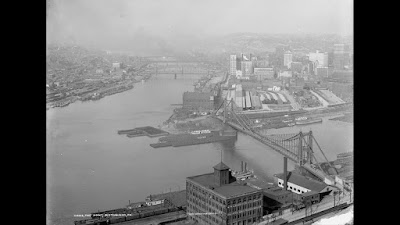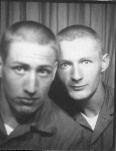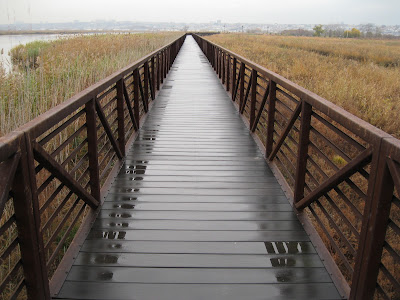Chapter 9: Approaching Pittsburgh
We crossed bridges, four of them, with an island in the middle, then Harrisburg was behind halfway between Philly and Pittsburg, signs along the highway counting down the miles until I had to change buses for Chicago. Twilight came. Blue mountains rose around us, and blue grass.
The man in the seat in front of me noticed my stare.
“If you think it looks good now, you should see it in
daylight,” he said.
By daylight I would be in or on my way to Chicago and I
wondered if I should get off the bus. The signs said 200 miles to Pittsburgh
with a number of smaller less significant towns in between: Green Spring,
Breezewood, Bedford, Somerset, Mt. Pleasant.
The hostess stayed silent now; the wheels hummed.
Would the bus stop before Pittsburg? What would I do if I
got off?
But the bus never stopped. The restroom at the rear of the
bus provided whatever passengers needed between where we were and where we were
going.
No one thought to supply an escape hatch.
Until I bought the ticket in New York, I had never heard of
Continental Trailways, and yet now I was trapped inside of one, filled with
elbows and knees sticking out into the aisle and the rustle of newspapers and
paper bags, shifting suitcases, and the snoring of weary passengers for whom
Pittsburg was just one more rest stop on the way to someplace else, chattering
about this or that without real concern as the
bus rushed towards Pittsburgh with the unrelenting urgency to meet it
schedule.
A child in the back hopped up and down on the seat, giggling
constantly, while other, more disciplined children sat morbidly in their own
seats staring back in envy, clearly wishing to do the same thing.
The squeal of the hostess’ microphone drew everybody’s
attention to the front of the bus, where she stood in her red and gold uniform.
Her name was Wanda and had spoken at intervals during trip from Philadelphia.
Like the driver, she would get off in Pittsburgh and serve the same role going
back.
"Most of you are
going to Los Angeles or points west of Saint Louis," she said. "You
will be traveling by what is called the southern route. This is fortunate. You
will not encounter the kind of inclement weather that the northern route
suffers this time of year. Weather forecasters claim you will not even likely
encounter rain."
She also talked about
the highways and how we would wander on and off what had once been called
"Route 66" but had over the years become bits and pieces of other
highways.
"Many of the
sights will still be there," she said. "The person who takes my place
for those parts of the trip will try to point them out."
Some of the businessmen mumbled somewhat obscene things
about Wanda under their breath.
"The road does that to them," Mrs. Warton later
told me, she one of the regular riders on the bus line, who had spent the
greater part of the last few years going from place to place to place, sort of
an extended vacation.
She was a
big-breasted woman whose age could have been anywhere between 40 and 60. She
laughed easily and talked loudly and seemed an odd contradiction to her much
shyer husband who wiggled his fingers at me when she introduced him. She had
done her hair up in a beehive, a fashion that ceased being popular the same year
the Beatles appeared on Ed Sullivan, but which seemed to take time to filter
down to women in middle America. It continually bumped into the baggage rack
above her whenever she stood up, drawing out of her a string of curses more
suited to a construction crew than a Christian lady.
"That's the only
bad thing about these buses," she said. "But Greyhound is
worse."
Mrs. Warton wore a light patterned dress of white and red
flowers. Bill wore a grey summer suit. Both sweated profusely as if still in
Florida. He patted his forehead with a handkerchief. She powered her face as
often.
At internals she nudged Bill who frequently nodded off and
started to snore.
When they pressed me for my name, I told them my last name
was “Calli” something I had invented by accident while on AWOL in New York. I
had mistakenly started to sign an anti-war petition.
"Calli?"
Mrs. Warton said, her puzzled expression saying she did not understand what
nationality to which I was laying claim.
"It's short for
Calovitch," I said quickly. "That's Russian. My family changed the
name when they came over."
She looked over my
face as if even this didn't solve the mystery, slowly shaking her head.
"No, you have no
features that are Russian," she said. "Does he, Bill?"
"That was on my
father's side," I said. "He was only half Russian himself. His mother
was Irish."
"I can see
that," Mrs. Warton said. "You have Irish eyes. Doesn't he,
Bill."
Mr. Warton agreed.
"But the rest of
you isn't Irish or Russian," Mrs. Warton went on. "What nationality
was your mother's family?"
"Italian and
German" I said, not lying about this part of it, which succeeded in a
knowledgeable nod from Mrs. Warton.
"I knew
it!" she said, clearly having scored a point. "It's all in the face.
Can you see it, Bill.”?
"It's in the
face," Bill again agreed.
"So where are
you from?" Mrs. Warton asked, making me extremely uncomfortable, not
because I believed her to be a spy for my family, but that her questions could
draw unnecessary attention to me, when I simply wanted to remain invisible.
"New York
City," I said, wishing I had made up some better lie, but could think of
none at the spur of the moment.
"Really?"
Mrs. Warton said. "We rode with someone from New York City on our last
trip, to Canada. What was the name of that nice couple, Bill? You know, the
people we rode with to Canada."
Bill after some
prying managed to come up with a name, which Mrs. Warton immediately confronted
me with and was extremely disappointed when I did not know them.
"I suppose it is
too much of a coincidence to expect everyone to know everybody," she
grumbled, then asked me what had me out on the road now.
I told her I was just
out of the army and wanted to explore the country a little.
"By bus?"
Bill asked, his Col. Sander's face taking up a puzzled expression. "I
would think a boy your age would own a car."
"That's a New
Jersey thing," I said. "In Manhattan, it's too big a pain to park to
own a car. But I'll be getting one when I get to where I'm going."
"And just where
are you going?" Mrs. Warton pressed, as if now suspicious about me because
I had not known the couple from their Canadian trip.
"I was thinking
of going to Denver," I said, before I could stop myself and tell them
another lie. I could have invented any place west of Chicago, only I couldn't
think of any at that moment.
"Denver? Are you
out of your mind? It's cold in Denver, and do you know how much snow they get
there this time of year? Tell him how much snow Denver gets, Bill."
Bill said Denver got
snow.
"I couldn't
stand to go to a place with that much snow," Mrs. Warton went on.
"Even when we took our little trip to Canada last year, we made sure that
we did it in July, so that there wouldn't be any snow. Isn't that right,
Bill?"
"We went to
Canada in July," Bill said.
"And that's why
we moved to Florida and live there year around when we're not traveling. If
there's snow there, we never hear of it, and if the temperature drops below 70
degrees, people there consider it a national disaster. Isn't that right,
Bill?"
Again, came the
automatic response.
"We're from Fort
Lauderdale," Mrs. Warton went on. "We're going to visit my sister in
Los Angeles."
"Santa
Monica," Bill corrected.
"Santa Monica,
Los Angeles, it's all the same place," Mrs. Warton continued, "and
though this isn't technically one of our usual vacations, we decided to take
the bus, see the scenery. Bill hates to fly anyway, says the seats are always
too crowded together or too expensive, and he complains about having jet lag
even after the shortest of trips. Better to go there the old-fashioned way, the
way the pioneers did, slow and steady, seeing something along the way. So
that's what we're doing."
"This bus
started in Fort Lauderdale?" I asked, wondering earlier why Philadelphia
had just seemed a stopover for the bus, rather than its point of origin, the
way New York City would have been.
"Hell, no,"
Bill grumbled. "Miami was, and we had to take two buses to get there, so
we could get on this bus west."
"Bill just hates
all that connection stuff," Mrs. Warton said. "He doesn't mind the
long trips, but the short ones get him, climbing in and out of buses, making
sure all the baggage has been changed over from one bus to the next. It can be
as bad as flying in that respect. He wanted to drive across country, but I told
him no. Bad enough he nearly gets us killed driving around Fort Lauderdale,
just think what he might do with 3,000 extra miles."
Bill grumbled and
turned his attention towards the window and the passing hills. It was
remarkable lush landscape considering the season, with grass that looked so
blue, it might have been Kentucky.
I nodded off and woke with a start when Wanda announced we
had arrived in Pittsburgh.




Comments
Post a Comment